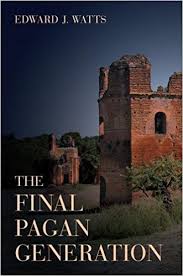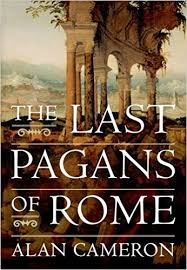
Blog-on-blog interaction. Feeling a 2005 vibe!
So here’s the context: I’ve been online for twenty years and have a “name” or “reputation”, and people approach me for advice a lot. If you’re surprised, trust me, I am too. This wasn’t a life aspiration of mine, I just kind of “fell into it.” Most people who read this weblog are aware of the nature of the cultural change over the past generation. In certain institutions and careers, people have to be very careful of what they say and exposing what they believe. They don’t feel they can trust anyone, but, they do feel that they can trust me. I can put people “in touch” who are “safe” close at hand because many people tell me what they “really believe.”
Last week I put a “blind item” out:
many years ago a prominent crypto-pagan who has the ear and esteem of many Christians told me they were considering coming out of the shadows and declaring their fidelity to the old gods. but i told them “no, you’re better off influencing the powers of this age.”
such is life
— Razib 🥥 Khan (@razibkhan) January 29, 2021
Once there is a reasonable gap in time I feel more comfortable saying things like this. For example, the far-left socialist who has more 50,000 Twitter followers who sent me a gushing fan message on Facebook in 2008, can you guess who that is? I won’t say!
In any case, who the person above is is immaterial. The person is influential among the high-middle-brow intelligentsia, and I think that’s a good thing. But Rod messaged me and asked what I was trying to say here. What did I mean “crypto-pagan” and “Christian”?
What I don’t mean is pagan and Christian in any literal sense. I speak in coded and cryptic terms that are clear to anyone who has eyes and awareness but is hidden to the blind. Some people follow me because of an interest in evolution and genetics have conventional liberal-left views. Obviously, I don’t mind offending people, but the outraged and over-wrought responses are tiresome, and engaging with people I am cordial with takes time and energy when our priors are so incredibly different that useful conversation is impossible (e.g., “cancel culture” is a myth, and clearly the people who reach out to me are “frauds who don’t exist”). So I have found if I speak in historical analogies these people simply shrug and move on since they don’t know enough history to make heads or tails of what I’m saying. In contrast, those who are “woke” to the intellectual conformity that many chafe under often become aware over time exactly what I’m talking about, and appreciate what I’m trying to get at (I have DMs to prove this).

The fundamental issue is when you have many people who read you, you want to speak in a different register to different people. So this sort of “language game” becomes highly useful. It is, after a fashion, using the “master’s tools against the master.”
Finally, this strategy is a concession that my naivete about “information wanting to be free” which is a hold-over from the 1990s is no longer something I hold to. There may not be an Inner Party, but there should be.
Addendum: Some of you may want to know exactly the sort of moments where people get “woke” and then reach out to me. In 2018 a graduate student in population genetics in a prominent lab read David Reich’s op-ed in The New York Times. They were relatively new to the field, but they agreed with the thrust of the op-ed. Their own projects involved human population genetics. They were shocked and confused when many (though not all) of their colleagues denounced the op-ed, with some casting aspersions at Reich’s mastery of the subject matter. The question that went through their head: were they insane, or was everyone around them lying?
I am quite aware that this person’s mentor is very “woke” (I use quotes for a reason) privately, but in public, they present as you would expect. Their ideological beliefs in this area were as vigorous and sincere as Ausonius’ Christianity. The graduate student reached out to me, and my “circle”, and we confirmed that yes, they were not insane. The old gods were real, and the pagan rites were true. The salvation that their colleagues proclaimed was just a damnation of the mind. Mind you, I did counsel taqiya. There are others who venerate Ali that I know still in academia. There is no need to become Husayn.




